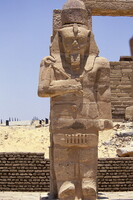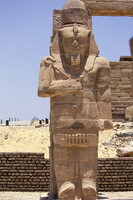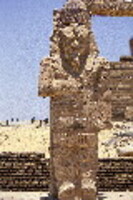| dc.coverage.spatial | Site: New Kalabsha Reconstruction (Aswan, Upper Egypt, Egypt) | en_US |
| dc.coverage.temporal | ca. 1279-1213 BCE (creation); ca. 1970 (other) | en_US |
| dc.creator | unknown (Egyptian (ancient)) | en_US |
| dc.date | -1279--1213 | en_US |
| dc.date.accessioned | 2013-04-17T18:22:31Z | |
| dc.date.available | 2013-04-17T18:22:31Z | |
| dc.date.issued | -1279--1213 | en_US |
| dc.identifier | 209073 | en_US |
| dc.identifier.other | archrefid: 984 | en_US |
| dc.identifier.uri | http://hdl.handle.net/1721.3/116953 | |
| dc.description | An engaged colossal statue of Ramesses II; The temple of Gerf Hussein (originally known as Per Ptah, or the 'House of Ptah') is dedicated to Ramesses II, and was built by the Viceroy of Nubia, Setau. Originally it was partially free-standing, and partially rock-cut. During the flooding of Lake Nasser the free-standing section was dismantled and has been reconstructed at New Kalabsha. Most of the rock cut temple was left in place and is now submerged beneath the waters. "The last two temples of Ramesses II's reign, at Gerf Hussein and el-Derr, are of inferior workmanship. The temple at Gerf Hussein (now submerged beneath Lake Nasser) was slightly simpler in plan than Wadi el-Sebua, although it incorporated a new feature in the form of a series of six statue groups, set into niches in the hall. Most of the temple was excavated in the rock; the very poor quality of this stone is to some degree responsible for the coarseness of the work and the squat appearance of the carved figures." Source: Grove Art Online; http://www.groveart.com/ (accessed 1/18/2008) | en_US |
| dc.format.medium | stone; painted relief; limestone | en_US |
| dc.rights | © Scott Gilchrist, Archivision, Inc. | en_US |
| dc.subject | architectural exteriors | en_US |
| dc.subject | rulers and leaders | en_US |
| dc.subject | Ramses II, King of Egypt | en_US |
| dc.subject | Ramesside period | en_US |
| dc.subject | Nineteenth Dynasty | en_US |
| dc.subject | New Kingdom (Egyptian) | en_US |
| dc.title | Temple of Gerf Hussein | en_US |
| dc.type | image | en_US |
| dc.rights.access | Licensed for educational and research use by the MIT community only | en_US |
| dc.identifier.vendorcode | 1A3-EG-K-4-B2 | en_US |
| vra.culturalContext | Egyptian (ancient) | en_US |
| vra.technique | construction (assembling) | en_US |
| vra.worktype | excavation (site) | en_US |
| vra.worktype | temple | en_US |
| dc.contributor.display | unknown (Egyptian (ancient)) | en_US |



